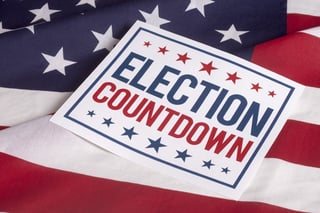 National politics are set to take center stage of media coverage, gripping the minds and TV sets of many American households.
National politics are set to take center stage of media coverage, gripping the minds and TV sets of many American households.
With political TV ad spending expected to eclipse $4.4 billion in this cycle,1 however, and with politicians on both sides jockeying early for a chance to secure the nomination, it feels like the elections are already upon us. With over a year to go for the presidential election, we’d advise you to buckle up – because it’s only going to get more intense from here.
To note, WrapManager is not taking a political stance with regard to elections – whether Democrats or Republicans control the White House and/or Congress is up to the voters. Our concern is the market and the economy, which while affected by politics, is not wholly controlled by it – there are plenty of other variables to consider.
In the past, election outcomes have formed patterns in the stock market, which may offer us clues for what to expect as the race takes shape. We’ll take a look at a few of those below.
Analyzing How Past Elections Have Affected Stock Market Performance
Here are some factoids and patterns that have emerged over the years:- Varying Returns Depending on the Year of Presidential Cycle - going back to the beginning of the 20th Century, and through 2014, the average annual gain for the Dow Jones Industrial Average has varied depending on the year of the presidential cycle:
- Year 1: +6.2%
- Year 2: +4%
- Year 3: +12.4%
- Year 4: +7.5%
- Democrat vs. Republican - from 1901 to 2013, the stock market has generally done better under Democratic presidents than Republican ones:
- Democrats: +7.9%
- Republicans +3%2
- Election Years are Generally Positive Ones - since 1928, the market has only been down four times in an election year:
- 1932 (Roosevelt v. Hoover): -8.2%
- 1940 (Roosevelt v. Willkie): -9.8%
- 2000 (Bush v. Gore): -9.1%
- 2008 (Obama v. McCain): -37%.
* That means the market has only been down in 4 of 22 election years since 1928, or less than 20% of the time.3
- Interesting Forward Looking Prediction - since 1980, Moody’s Analytics has been predicting presidential election results, and it has been spot-on for the last nine contests. In 2012, Moody’s even predicted each state’s election outcome and accurately forecast the Electoral College vote. It just recently released it’s prediction for 2016, and it has the Democratic nominee winning by a slim two electoral votes4 – a nail biter.
Remember that Politics are Just a Piece of the Bigger Puzzle
Politics and elections can have some influence on the markets, perhaps to the extent that new laws or regulations affect the way companies do business and get taxed. But we won’t know those things until new leaders take office and start introducing initiatives. All that to say, the next year of campaigning and all the media attention that comes with it may not mean so much to the stock market. Remember there are a myriad of other factors to consider, like economic growth, earnings, inflation, interest rates, and so on.
If you would like to discuss our views on where we think the market and the economy are headed from here, feel welcome to call a Wealth Manager today at 1-800-541-7774 or contact us here. We’d be happy to start a dialogue with you about the markets and your current investment approach.
Sources:
1. NPR
4. Forbes





